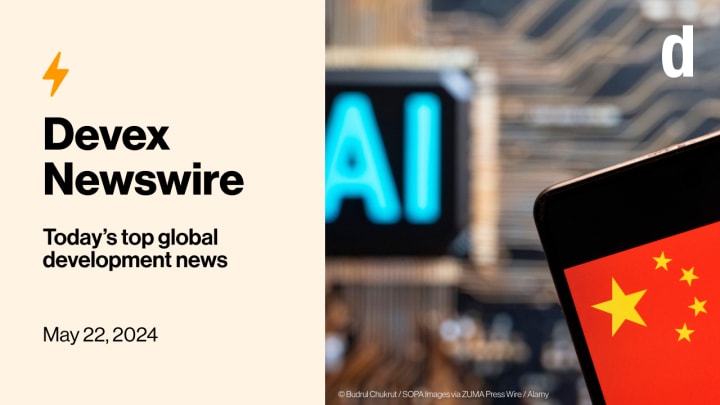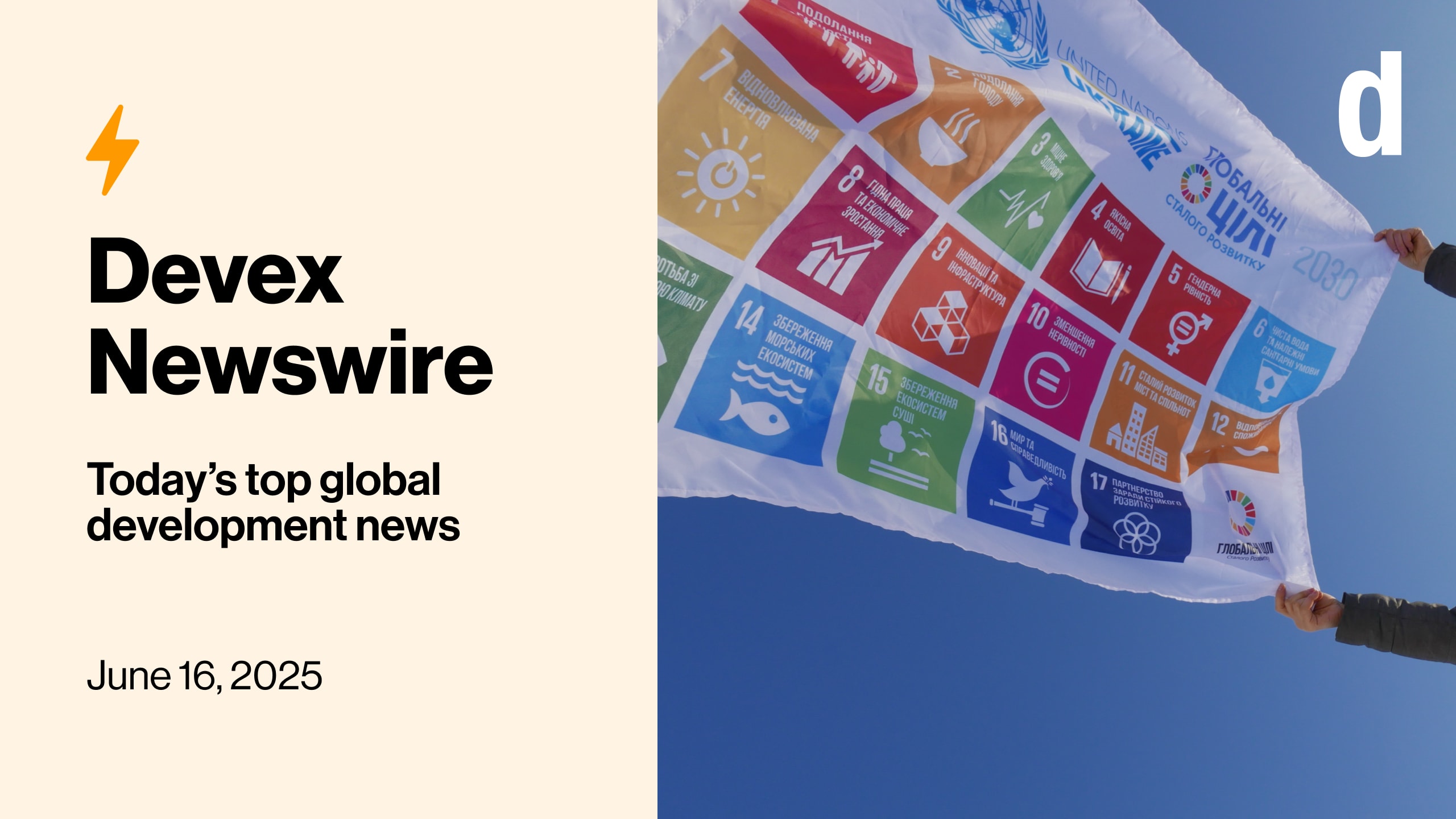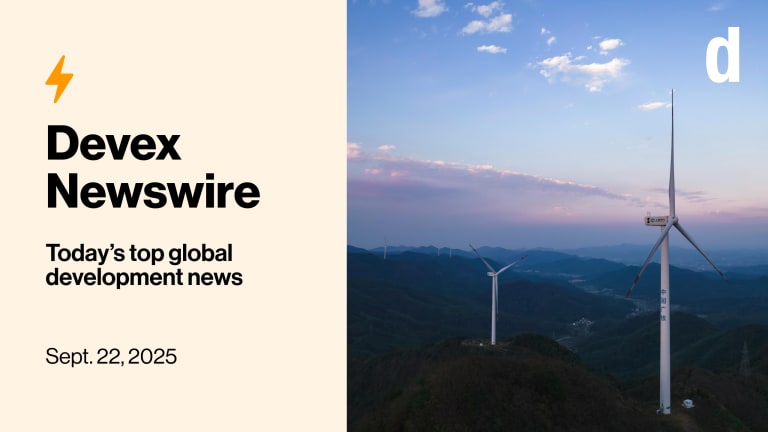Presented by Tetra Pak

China is pushing for more internet control at the United Nations, citing national security, while Western nations have resisted, emphasizing tech freedom and human rights. We bring you exclusive details on the latest geopolitical tussle.
Also in today’s edition: Vulnerable nations may get a radical revision to how they receive aid to account for climate disasters, and what Africa’s LGBTQ+ community is asking for.
This is a preview of Newswire
Sign up to this newsletter for an inside look at the biggest stories in global development, in your inbox daily.
+ Join us today at 10 a.m. ET (4 p.m. CET) for our career event as we dig into how to navigate the employment landscape later in your career. Save your spot now. Can’t attend live? Register anyway and we’ll send you a recording.
Cyber clash
China is seeking to tighten its digital fist at the U.N., pushing for more state control over the internet and protect national security and sovereignty in the freewheeling digital world, according to U.N. documents to which Devex Senior Global Reporter Colum Lynch got access.
At the same time, it’s straining to secure access to advanced Western technology, and chipping away at human rights protections for civil society, writes Colum in an exclusive report.
This behind-closed-doors negotiation comes as the U.N. hammers out a declaration on what’s been dubbed the Global Digital Compact, which aims to use artificial intelligence to eliminate poverty and inequality, among other global ills, and to lay out the rules for digital communications.
But the deliberations highlight the rift between China, along with some of its authoritarian allies, and the U.S. and many other Western countries. China wants to rein in and control social media, while the U.S. and others want to protect tech company rights and keep the digital world more open.
Of course, both sides claim this is all part of efforts to accelerate achieving the Sustainable Development Goals.
China has suggested some changes, framed around the need to prevent online crimes and stop the spread of information that could harm national security and promote terrorism, separatism, and extremism. But this kind of talk has been used before to justify some pretty serious human rights crackdowns on dissidents and ethnic minorities such as Uyghurs. The Chinese mission to the U.N. didn’t have anything to say about these proposals.
“AI has become the latest flashpoint for geopolitical control of technology,” Anna Bacciarelli, associate technology director at Human Rights Watch, tells Colum. “As with all technology governance, it’s essential that international human rights law, including free expression and privacy, be at the center of all U.N. discussions about the future of the digital space.”
Exclusive: At UN, China seeks greater state control over internet
+ May is the last month to take advantage of early-access pricing for Devex World! Join us on Oct. 24 in Washington, D.C., at Studio Theater to connect with leaders shaping the future of global development. Get your ticket by May 31 before prices increase.
MCC’s money pot
Earlier this month, the Millennium Challenge Corporation, a U.S. government agency dedicated to reducing poverty in the world's lowest-income nations, unveiled its latest midyear business forecast for 2024, showcasing a substantial $546.5 million pipeline spread across 187 contracts.
The forecast provides a comprehensive view of MCC’s priorities, offering crucial insights for businesses and organizations looking to engage in development projects. But it’s 157 pages, so Devex data analyst Miguel Antonio Tamonan breaks it down into a digestible couple of pages with charts.
The Department for Compact Operations, which manages overseas missions, dominates the procurement landscape with a budget of $266.2 million allocated for 100 opportunities, comprising almost half of the total. Devex Pro readers can take a look at the rest of the breakdown.
Read: How MCC plans to spend almost $550 million in the coming months (Pro)
+ A Devex Pro membership gives you access to all our expert analyses, funding data, exclusive events, networking opportunities at our summits, and more. Not a Pro member yet? Start your 15-day free trial today.
Storm of change
Antigua and Barbuda was on the brink of becoming a "high-income" nation, no longer needing development aid, until Hurricane Irma hit in 2017. The category five storm devastated Barbuda, destroying 90% of structures and forcing all 1,800 residents to evacuate to cramped shelters in Antigua.
Two weeks later, Hurricane Maria brought similar destruction to nearby Dominica, obliterating 226% of gross domestic product in a nation classified as "upper-middle-income," thus limiting its access to aid and concessional finance.
These catastrophic events highlighted the flaws in the allocation system for development assistance, which focuses narrowly on national income while ignoring vulnerability. In a warming world, these "once-in-a-lifetime" weather disasters are becoming increasingly common.
Small island developing states are particularly vulnerable, writes my colleague Rob Merrick. Wealthy individuals buying luxury homes skew income statistics, hiding deep poverty. Seven years later, the U.N. is set to discuss a radical plan to revise aid rules to account for climate vulnerability.
“Many small islands, and subsequently many developing countries, have seen that the current measurement for whether a country has graduated out of aid assistance is not fair or not working in their best interests. The momentum is really strong,” Walton Webson, Antigua and Barbuda’s permanent representative to the U.N., tells Rob.
Read: Aid rules shake-up offers hope to climate-threatened small islands
Left high and dry
As LGBTQ+ activists in Africa face new legal challenges in Uganda and Ghana, they urge Western donors to intensify support.
In Ghana, the Supreme Court has delayed a hearing on a controversial bill that criminalizes LGBTQ+ sexual activity, with prison sentences ranging from six months to three years. In Uganda, a recent court ruling struck down parts of the Anti-Homosexuality Act 2023 but upheld its constitutionality overall. The law prescribes the death penalty for “aggravated homosexuality.”
But what has been done to help? Not too much, say activists. The European Union has been criticized for its insufficient response to LGBTQ+ rights violations, and activists protested at the EU delegation in Washington, D.C., demanding sanctions on Uganda.
Activists are calling for increased funding to support LGBTQ+ initiatives, aiming to counter anti-rights movements and promote inclusion and diversity. They argue that Western evangelical groups hold significant influence in Africa, not just financially, but ideologically.
“We need to strategize if we are to win this fight,” says Steven Kabuye, co-executive director of Ugandan NGO Coloured Voice Truth to LGBTQ. “The surging anti-gay laws in Africa are reason enough to show that we are losing the fight in Africa.”
Read: What African LGBTQ+ activists need from donors amid anti-gay law surge
Arm-ageddon
It fell to Andrew Mitchell, the U.K.’s international development minister, to defend the government’s judgment that Israel is not breaching humanitarian law in Gaza — and therefore can continue to be sold weapons.
That is no easy task, when the chief prosecutor of the International Criminal Court — advised by a clutch of eminent British lawyers, recognized as experts in international law — has reached the opposite conclusion and wants the Israeli prime minister behind bars. And it showed, Rob tells me.
In a difficult grilling by members of Parliament, Mitchell was presented with three other credible pieces of evidence of a breach: that the U.K. government has stated that Israel has put forward no plan to comply with humanitarian law in the assault on Rafah now underway; that it has identified a breach in Israel’s linking of the supply of aid to the release of its hostages; and that the U.S. State Department believes American-supplied weapons may have been used in ways that are in breach.
“You're inviting us to believe that, when you put all four of those factors into an assessment, the conclusion you still reach is that Israel has the intent and capacity to follow international humanitarian law and therefore arms export licenses are still OK?” he was asked.
“That is precisely the right conclusion,” Mitchell replied without hesitation — having previously insisted his government is acting entirely properly in keeping its legal advice secret.
In other news
EU ministers have approved the world’s first law regulating AI, which will set regulations for its use in “high-risk” sectors, including law enforcement and employment. [DW]
Human rights group Asylum Aid filed a high court challenge against Britain’s policy of sending asylum seekers to Rwanda. [Reuters]
A new report found that 4.2 billion people, or 53% of the global population, live in countries where freedom of expression is in crisis, with conditions worsening in 78 countries. [VOA]
Sign up to Newswire for an inside look at the biggest stories in global development.








